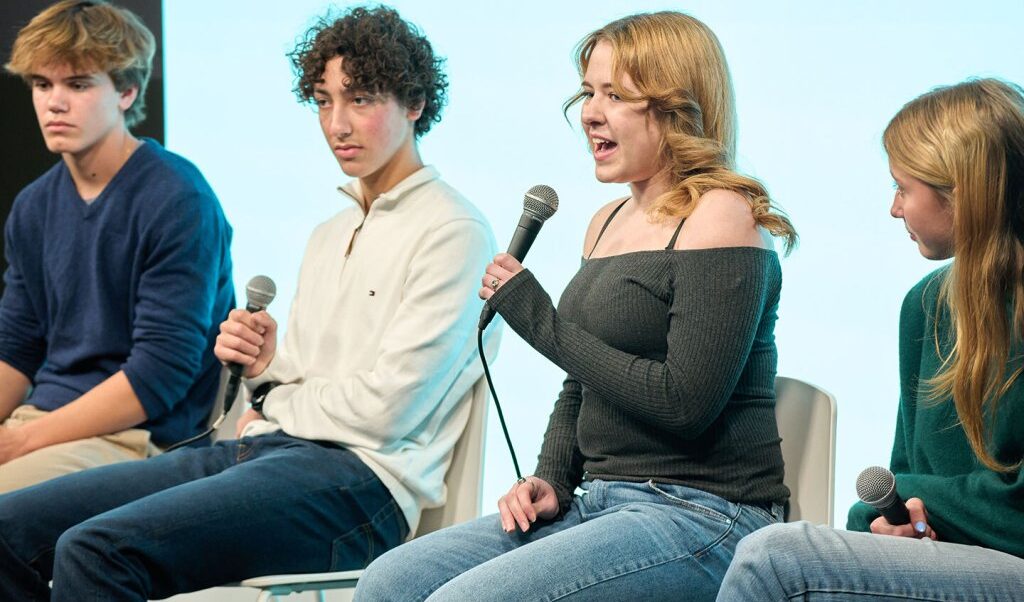If you purchase an independently reviewed product or service through a link on our website, SheKnows may receive an affiliate commission.
Getting my three teenagers enthusiastic about school is like getting them enthusiastic about a root canal: virtually impossible. There is no jumping out of bed eager to get to class. Instead, there is protest … sooo. Much. Protest. This makes me sad — because when they were little, they were voracious learners, soaking up information like little sponges and seemingly enjoying the process. I hoped that this was a sign that they’d be lifelong lovers of information, but that doesn’t seem to be the case. Instead, I’m met with resistance at every turn these days. Why are they so apathetic about it? When did something they used to love turn into something that elicits such dread? I’m left wondering where things went wrong … where we failed them.
I know I’m not alone in this; far from it, in fact. To provide parents of teens (ourselves included!) with much-needed insight, SheKnows called in the experts: We hosted a live event featuring Jenny Anderson and Rebecca Winthrop, authors of The Disengaged Teen: Helping Kids Learn Better, Feel Better, and Live Better. (You can watch the entire video here.) But maybe the most insightful part of the evening was when four teenagers from SheKnows’ own Gen Z Council — Clive, Santiago, Chloe, and Greta — joined the experts onstage and weighed in on a couple of very important questions: What do grownups get wrong about being a student today? If you could change one thing about school, what would it be?
For starters, the stress of it all — a sentiment echoed by not only our other Gen Z panelists, but also the teens interviewed in the course of Anderson and Winthrop’s research.
“I don’t know if parents always understand the extent of the pressure we can be under throughout school,” laments Greta. “It really does feel like sometimes you have to be ‘on’ all the time.” She wishes parents would appreciate the restorative value of taking a break, because burnout isn’t a feeling reserved only for adults (and in today’s “grind culture,” teens are more familiar with that feeling than ever). Greta says she’s “drained” after school and doesn’t want to jump right into homework: “I’m not gonna be able to put my best work forward, and I just think taking breaks is not having a bad work ethic, and I think it’s OK to do that sometimes.”
Winthrop says those breaks, which she calls “radical downtime,” are absolutely essential. “Kids do need breaks, scientifically,” she says. “Taking a break is not a bad work ethic. It actually reenergizes you, makes you able to sustain effort longer.”
Stress can lead to a lack of motivation, which is a true killer of productivity. “It kills the momentum that you have at the beginning of the year,” says Santiago. “At the beginning of the year, you’re fresh … and then stress just really slows you down.”
Another de-motivator? Parents — or, more specifically, their reactions to less-than-desirable academic outcomes. (Womp, womp.) Of his own parents — and, I’m sure, just about everybody else’s — Clive says, “My parents think that when I get a bad grade, maybe I’ll get motivated to do better … or that it would be a wake-up call.” But in fact, it’s pretty much the opposite. “I feel like once I get one bad grade, I just instantly lose all motivation. … If I try at all at a math test and I fail, that’s kinda all I’ve got, and I get a little bit annoyed and stop trying. I go down a rabbit hole of feeling like I can’t do better than what I did last time.”
Chloe admits she takes it personally when her parents criticize. “When someone brings [a bad grade] up you can feel attacked … and a lot of times it’s not just about school. … It’s about the ten other things you’ve got going on, on top of that test, and it can really feel overwhelming when someone nitpicks about one specific part of your life where you might not be doing that well.”
In their book The Disengaged Teen, Anderson and Winthrop write that there are four modes of student engagement: Passenger Mode, where the student just coasts by on the bare minimum effort, often procrastinating and detaching; Achiever Mode, where a student strives for excellence, at the cost of extreme burnout and fear of failure; Resister Mode, where the student is often seen as the “problem child” who actively resists learning; and Explorer Mode, the ideal mode in which a student is engaged and pursues learning with curiosity and passion. Winthrop reports that in widespread studies, students who spend the most time in Explorer Mode get better grades. But getting to Explorer Mode is a challenge — especially, opine the teens, with the way schools are typically set up.
“One thing I would change is that learning, and how school is set up, is for a very specific style of learning, and not everyone learns the exact same way,” says Chloe. “I wish we had more choice and we could choose the way that’s going to help us excel the best … because people have different styles of learning, and really forcing us all into this one box makes it so that there are people who are gonna really, really struggle.”
Clive admits that a lack of choice leaves him feeling less-than-inspired. “I’m not sitting there wanting to learn … I’m just being pushed into these classrooms where things are being thrown at me, but I’m not choosing to go to these classes. I’m not choosing what I want to learn. I’m just getting through my day,” he says. “I wish I had more say in what I was learning, because I feel like when you’re part of the choice of what you’re learning, it’s a lot more important to you. You feel like you actually want to learn about it because that’s what interests you.”
And Greta thinks that even school curriculums with the best of intentions fall short. “I wish my school were more flexible when it comes to the rules and requirements,” she says. “I think schools like to promote the Explorer Mode, but I don’t think they’re flexible enough for us to really be able to achieve that.”
Hear more about what teens wish parents knew — and what changes they’d make at school – in the video above, and watch the full SK Conversations event with Jenny Anderson and Rebecca Winthrop here.




